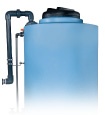Sulfuric acid can be a tricky chemical to store. Used in a wide variety of industrial applications, sulfuric acid is heavy, can create toxic or flammable gas, and can burn the skin. A smart storage solution for sulfuric acid should start with a well-thought-out tank design — not just the tank material but the entire storage system and all its components. Thinking through the entire sulfuric acid tank system design up front will help you protect your employees, the environment, and your investment. Read on for our recommendations on the right material, configuration, and standards for safe sulfuric acid storage.
Topics:
Chemicals,
Chemical Storage
Sodium hypochlorite is a well-known and aggressive oxidizer that is used in many applications. Our end-use customers often use “hypo” in the water treatment business to eliminate bacteria and viruses from water supplies. Anyone looking to maintain a safe and secure storage tank system has three challenges to overcome: UV rays, off-gassing, and oxidation. Over the years, Poly Processing has established a set of industry leading best practices that represent an ideal sodium hypochlorite storage system for overcoming these challenges.
Topics:
Chemicals
Sodium hydroxide, also known as caustic soda or liquid lye, is commonly used to adjust pH levels in water and wastewater and can easily change hard water to a much closer approximation to neutral when injected into the water treatment system. Caustic soda can act as a corrosion inhibitor without the uneven distribution of calcium carbonate. Caustic soda is also used in the manufacturing of chemicals, rayon, cellophane, paper, detergents, soaps, and a variety of other products.
Topics:
Chemicals
Phosphoric acid is one of the top ten chemicals used in the United States. Phosphates have many uses in the treatment of drinking water. Food grade phosphoric acid is common in the food industry, and it’s even used in pharmaceuticals, detergents, and textile pigments.
Topics:
Chemicals
In 2010, the Environmental Protection Agency mandated the use of selective catalytic reduction (SCR) in diesel engines. In an SCR-equipped vehicle, the exhaust gas from the engine goes through a particulate filter to eliminate the soot and ash generated from burning diesel fuel.
Topics:
Chemicals,
Applications
Firefighting foam is commonly used at airports, hangars and other locations where hazardous fires can occur. The foaming agent used in the foam in most cases is a surfactant based chemical. Surfactants are compounds that lower the surface tension between two liquids, or a liquid and a solid. Dishwashing liquid contains surfactants—and like firefighting foam, it foams up when it mixes with water.
Topics:
Chemicals
The food and beverage industry has a long history of relying on stainless steel storage tanks due to the belief that the resins in a polyethylene storage tank allow leaching and bacterial growth with food dyes and other food products.
Topics:
Chemicals,
Applications
Liquid glues, or white glues, are water-based adhesives that are used in a wide variety of applications. They’re popular, because they are eco-friendly, non-toxic, easily recyclable, and safe to handle.
Topics:
Chemicals
In industry, a great deal of manufacturing is made from very few chemicals. Here are four of the most commonly produced and used chemicals. All of these chemicals are produced in excess of 100 million metric tons per year.
Topics:
Chemicals,
Chemical Storage
If your industrial company produces hazardous runoff from operating equipment, you need to treat the wastewater before dumping it into the sewer or wastewater stream. Depending on your industry, you may need to have a very detailed process that meets the highest standards. Each state and city might have their own standards and regulations you’ll need to meet, or you might be under federal regulations.
Topics:
Chemicals,
Tank Design and Materials,
Chemical Storage



